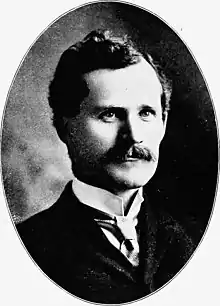William Hussey (astronomer)
William Joseph Hussey (August 10, 1862 – October 28, 1926) was an American astronomer.
William Hussey | |
|---|---|
 | |
| Born | August 10, 1862 |
| Died | October 28, 1926 (aged 64) London, England |
| Nationality | American |
| Education | University of Michigan, BS in Civil Engineering (1889) |
| Spouse(s) | Ethel Fountain |
| Children | Roland Fountain and Alice Lillian |
| Scientific career | |
| Fields | Astronomy |
| Institutions | University of Michigan, Stanford University, Lick Observatory |
He is most famous for the discovery and study of close binary stars. In the period from 1898 to 1899, he reobserved all binaries discovered by Otto Struve, with at least three observations of each. His amazing efficiency is demonstrated by these numbers: he made 1,920 observations in one year, with a record of 80 in one night. At the conclusion of his double star work in 1905, he had discovered and measured 1,327 close binaries. For this work, he was awarded the Lalande Medal in 1906, which he shared with Robert Grant Aitken.
He was born at Mendon, Ohio, August 10, 1862, son of John Milton and Mary Catherine (Severns) Hussey.[1] After graduating with a BS in civil engineering from the University of Michigan in 1889, he served as assistant in the Nautical Almanac Office of Washington. He soon returned to Ann Arbor as instructor in mathematics, and became instructor in astronomy in 1891.
In 1892, he joined the faculty of Stanford University as professor of astronomy. From 1896 to 1905 he was Astronomer at the Lick Observatory, returning to the faculty of the University of Michigan in 1905 to become professor of astronomy and director of the Detroit Observatory.[2]
In 1897, he was elected president of the Astronomical Society of the Pacific. The Lamont–Hussey Observatory in Bloemfontein, Free State, South Africa was named after him.
References
- Hinsdale, B.A. (1906). History of the University of Michigan. Ann Arbor, MI: University of Michigan. p. 328.
- Hinsdale, B.A. (1906). History of the University of Michigan. Ann Arbor, MI: University of Michigan. p. 328.